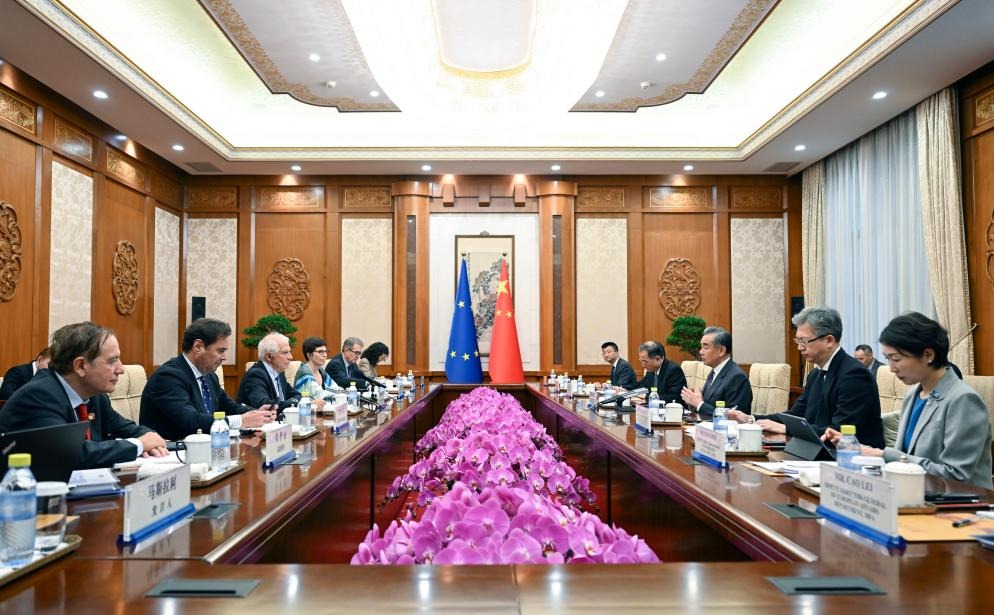In a significant diplomatic move, Chinese Foreign Minister Wang Yi has called for an end to cooperation obstacles between China and the European Union (EU) to ensure the stable and prosperous development of bilateral relations. This call came during the 12th round of the China-EU High-level Strategic Dialogue, jointly held by Wang Yi and Josep Borrell, the high representative of the EU for foreign affairs and security policy.
Resolving Differences and Expanding Cooperation
Wang Yi, a member of the Political Bureau of the Communist Party of China Central Committee, emphasized China’s deep commitment to its relations with the EU, viewing the EU as a pivotal, independent force in a multipolar world. As 2023 marks the 20th anniversary of the comprehensive strategic partnership between China and the EU, Wang highlighted the recent successes in bilateral relations. These achievements include a resurgence in exchanges at all levels, high-level meetings in various sectors like green, digital, economic, and trade, which have resulted in renewed consensus and tangible outcomes. These successes underscore the robust and dynamic nature of the China-EU relationship.
Wang stressed the importance of maintaining a clear understanding of each other through strategic dialogue, fostering political mutual trust, and avoiding misunderstandings and miscalculations. He also advocated for preparations for a leaders’ meeting by year-end, reinforcing the commitment to mutual openness, expanding trade and investment, opposing decoupling, and promoting people-to-people exchanges. Furthermore, he called for both parties to champion multilateralism and jointly address international and regional issues, providing stability and certainty to the world.
EU’s Commitment to Constructive Cooperation
High representative Josep Borrell reciprocated Wang’s sentiments by underscoring the EU’s commitment to constructive and stable relations with China. He highlighted the mutual benefits derived from economic and trade cooperation, underlining that the EU remains open to China and will not engage in a trade war or seek to contain China’s development. Borrell also expressed the EU’s desire to strengthen cooperation with China on climate change.
China’s Position on Palestinian-Israeli Conflict
In the wake of the ongoing Palestinian-Israeli conflict, Wang Yi and Josep Borrell jointly addressed the press following their high-level dialogue. Wang expressed China’s stance on the matter, condemning acts that harm civilians and any violations of international law. He emphasized the urgent need for a ceasefire to stop the conflict, uphold international humanitarian law, and ensure civilian safety. Wang advocated for all concerned countries to remain calm and restrained while allowing the United Nations (UN) to play its role in resolving the Palestinian issue.
Wang Yi reiterated China’s stance in favor of peace, justice, international law, and the common aspirations of most countries, as well as human conscience in addressing the Palestinian question. China is actively participating in UN Security Council consultations and supporting the UN Secretary-General Antonio Guterres’ appeal for the protection of civilians. Additionally, China is providing emergency humanitarian aid to the Gaza Strip and the Palestinian National Authority through UN channels.
Highlighting the core nature of the Palestinian question within the Middle East, Wang argued that the historical injustice suffered by the Palestinian people remains unresolved, and the Palestinian aspiration to establish an independent state has not been fulfilled. He affirmed the right of both Israel and Palestine to establish states, asserting that the two-state solution offers a path to peaceful coexistence between the two entities, ensuring harmony between the Arab and Jewish peoples.
Wang Yi concluded by emphasizing that the full implementation of the two-state solution is the key to achieving real peace in the Middle East and lasting security for Israel. To reach this goal, he called for an early resumption of peace talks and the positive involvement of mechanisms that promote peace. In addition, China’s special envoy for the Middle East will soon visit relevant countries in the region to help reduce tensions. Lastly, China encourages the prompt convening of a conference under UN auspices to build international consensus and advance a comprehensive, just, and lasting settlement of the Palestinian question.















